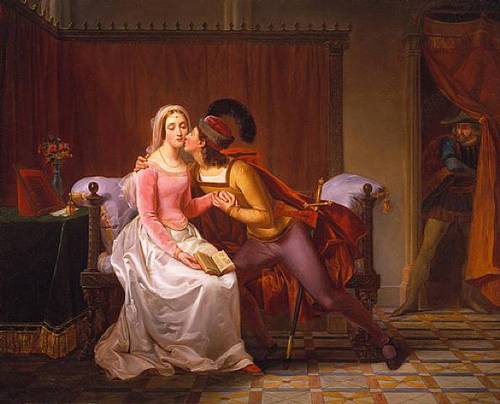dentiloquy
n. speech through gritted teeth
Language
Curiosities of Morse Code
- SISSIES: ··· ·· ··· ··· ·· · ···
- MOTTO: -- --- - - ---
- ENTENTE: · -· - · -· - ·
- TARTAR: - ·- ·-· - ·- ·-·
- POSSESSIVENESS: ·--· --- ··· ··· · ··· ··· ·· ···- · -· · ··· ··· (18 dots in a row)
- SERVOMOTOR: ··· · ·-· ···- --- -- --- - --- ·-· (12 dashes)
INTRANSIGENCE is a palindrome: ·· -· - ·-· ·- -· ··· ·· --· · -· -·-· ·
Coming and Going
Prospicimus modo quod durabunt faedera longo
Tempore, nec nobis pax cito diffugiet.
That means “We foresee now that the confederacy shall last a long time, and that peace will not quickly fly away from us.” But reverse it:
Diffugiet cito pax nobis, nec tempore longo
Faedera durabunt, quod modo prospicimus.
and it means “Peace will soon fly away from us, and the covenant shall not last long, which we foresee already.”
See also A Bilingual Palindrome.
Double Duty
LIST and ROLL are synonyms in two different senses.
Both mean to tilt — and both refer to a series of names.
In a Word
onymous
adj. not anonymous
Hearing Trouble
- AURAL means heard; ORAL means spoken.
- RAISE means erect; RAZE means tear down.
- SUCCOR means aid; SUCKER means hoodwink.
- ENUMERABLE means countable; INNUMERABLE means uncountable.
- ERUPT means burst out; IRRUPT means burst in.
- ERADICATE means pull up by the roots; IRRADICATE means root deeply.
- PETALLESS means lacking petals; PETALOUS means having petals.
- RECKLESS means careless; WRECKLESS means careful.
“Power of Short Words”
Bible scholar J. Addison Alexander was once asked whether one could write as forcibly in monosyllables as in long words. He responded with a poem:
Think not that strength lies in the big round word,
Or that the brief and plain must needs be weak.
To whom can this be true who once has heard
The cry of help, the words that all men speak
When want or woe or fear is in the throat,
So that each word is gasped out like a shriek
Pressed from the sore heart, or a strange wild note,
Sung by some fay or fiend? There is a strength
Which dies if stretched too far or spun too fine,
Which has more height than breadth, more depth than length.
Let but this force of thought and speech be mine,
And he that will may take the sleek fat phrase,
Which glows and burns not, though it gleam and shine–
Light but not heat–a flash, but not a blaze!
Nor is it mere strength that the short word boasts;
It serves far more than wind or storm can tell.
Or roar of waves that clash on rock-bound coasts,
The crash of tall trees when the wild winds swell,
The roar of guns, the groans of men that die
On blood-stained fields. It has a voice as well
For them that far off on their sick-beds lie;
For them that weep, for them that mourn the dead;
For them that dance and laugh and clap the hand
To joy’s quick step, as well as grief’s slow tread;
The sweet plain words we learn at first keep time,
And though the theme be sad, or gay, or grand,
With each, with all, these may be made to chime,
In thought, or speech, or song, or prose, or rhyme.
In a Word

basial
adj. pertaining to kissing
Apt

In Pig Latin, TRASH becomes ASHTRAY.
In a Word
gammerstang
n. a tall, awkward person, usually a woman
